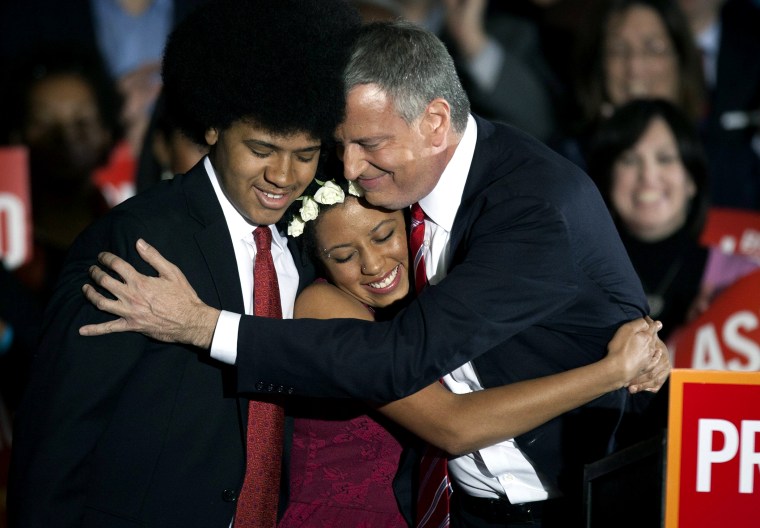Just a few months ago, you could have been forgiven for never having heard of Bill de Blasio.
But the Democratic candidate whose progressive values and multi-racial family became central to his message rode a populist wave to a monster victory Tuesday night, becoming New York City’s first Democratic mayor in 20 years.
The New York City Public Advocate beat long-shot Republican Joe Lhota by a landslide 73% to 24%, according to the latest exit polls. It was a massive win for progressives, as de Blasio promised to be Gotham's most liberal mayor in several decades. He has pledged to tax the city’s rich to fund education, focus on affordable housing, and reform the city’s controversial stop-and-frisk tactics.
“Thank you, New York City,” de Blasio tweeted shortly after the projected win. He attached a photo of him and his family with their arms around each other after de Blasio cast his vote earlier in the day.
During his victory speech at the YMCA in Brooklyn--not Manhattan--de Blasio said New Yorkers spoke loudly and clearly at the ballot box “for a new direction for our city,” one in which residents are “united by a belief that our city should leave no New Yorker behind.”
He said that while the city’s problems won’t “be solved overnight…make no mistake. The people of this city have chosen a progressive path, and tonight we set forth on it together as one city.”
New York Gov. Andrew Cuomo released a statement congratulating “a true friend and former colleague.” The Democrat added, “He has the experience to run New York City, a compelling vision for its future and he and his family epitomize the New York story. …I know Bill will be a tremendous partner in moving this great city forward.”
De Blasio's campaign ads featured his children and their middle class home in multi-racial Brooklyn. The ads drew enormous appeal for many voters in a melting pot city of 8 million. His impressively Afro-ed 15-year-old son Dante emerged as a star and regular presence on the campaign trail.
De Blasio was a little known candidate just six months ago amid a crowded field of bold faced names running in the Democratic primary. But one-by-one, the competition fell as progressives turned against City Council Speaker Christie Quinn, who was embraced by Wall Street and seemed to offer an extentsion of Michael Bloomberg's three-term leadership. Former congressman Anthony Weiner tried to use the mayoral race to stage a political comback before he was destroyed by more revelations of sexting and emailing with female fans.
De Blasio, who stands at 6’ 5’’ – literally a head above his competition -- frequently touted economic fairness on the campaign trail, insisting that without a “dramatic change,” an “economic policy that combats inequality and rebuilds our middle class, generations to come will see New York as little more than a playground for the rich.” He ran as a family values man and a candidate who sticks up for the little guy, pitching himself as both the anti-Weiner and the anti-Bloomberg. He successfully tied Quinn, a one-time frontrunner, to Bloomberg, saying she represented the 1 percenters.
The soon-to-be Hizzoner was partially propelled to victory by the city’s public financing system, which doesn’t allow the city’s financial and powerful elite to buy excess sway. Individuals are allowed to give a maximum of $4,950. Here’s the real key though: The city is one of the few in the country, in which each dollar that a donor gives to a candidate is matched by six dollars in public funds, up to $175.
That means for candidates, smaller donations are actually worth seven times their actual value, which incentivizes those running to focus smaller donors, versus the 1 percenters who can dish out lots of cash.
The Big Apple system has been around since 1988, but has been dulled in the last three mayoral cycles because of Bloomberg’s multi-billion-dollar personal fortune. The outgoing mayor, who worked City Council to get himself a third term, did not endorse any candidate though he seemed to prefer Quinn for a period.
For de Blasio, the truly hard part is yet to come as he will need to carve out a leadership style and run the financial and cultural of capital of America. Rudy Giuliani’s legacy was one of economic prosperity and public safety. Bloomberg’s was one of bouncing back after 9/11 and enforcing a nanny-state of health regulations. Many liberals hope that de Blasio will fight for economic and racial equality. But he will have to walk a fine line with Wall Street and millions of residents who are not eager to see already high city taxes increase. He will also need to negotiate over critical services, including schools and transportation, with the governor in Albany.
“There’s not likely to be support for any increase in taxes is an election year,” even from Gov. Andrew Cuomo, who’s up for another term in 2014, said Ken Sherrill, a political science professor at Hunter College. De Blasio “won’t be every progressives' dream come true over night,” noting there’s likely to be Republican roadblocks and that, put simply, big program changes take time.
